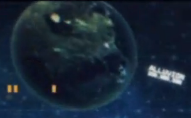Alluvion
From Halopedia, the Halo wiki
| Alluvion | |
|---|---|

| |
| Astrographical | |
|
System: |
|
|
Orbiting: |
|
|
Orbital position: |
Third planet[1] |
|
Moon(s): |
|
| Physical | |
|
Diameter: |
6,931 kilometers (4,310 mi)[1] |
|
Gravity: |
0.99 G[1] |
|
Atmosphere: |
|
| Societal | |
|
Species: |
|
|
Population: |
+336 million[2] |
|
Colonized: |
|
|
Government: |
|
Alluvion, also known as Bhaakto III,[3] is the third planet in the Bhaakto system[1] and a human Outer Colony of the Unified Earth Government.[4][5] Alluvion is orbited by the natural satellite Fallow. Once home to millions, Alluvion was glassed by the Covenant during the Human-Covenant War. By 2554, Alluvion has been recolonized.[1]
History
Alluvion was colonized by the Unified Earth Government in 2412 as a border world and prominent waystation between the Inner Colonies and the emerging Outer Colonies.[1] By tradition, the colonization of Alluvion was considered to be start of human expansion into the Outer Colonies.[5] With vast oceans and a moderately tropical climate, the planet required little terraforming, though aggressive tidal activity caused by Alluvion's moon Fallow forced most population centers into the continental interiors. Alluvion was highly cherished by its residents, though the planet's history was largely uneventful until the Human-Covenant War.[1]
Covenant scouting patrols located Alluvion in 2541, though a full-scale invasion—led by Thel 'Vadamee—did not occur until 2542. During the Battle for Alluvion, the United Nations Space Command was able to defend the planet with a substantial military force, keeping the Covenant forces at bay for weeks. However, a Covenant support fleet arrived and quickly severed Alluvion's critical support lines, and the planet fell shortly after.[1] Spartan Gabriel Thorne's parents were UNSC Army officers stationed on the planet at the time. They, along with Alluvion's human population, died when the Covenant glassed the planet.[4] In the glassing, Alluvion's major population centers and spaceports were destroyed and no sign of human activity remained on the planet by 2544.[1] On September 26, 2552, Alluvion was used as an example of the planets glassed by Covenant forces in Office of Naval Intelligence operative Jameson Locke's target profile of Thel 'Vadamee.[2]
Following the Covenant War, a recolonization support fleet of the Unified Earth Government returned to Alluvion in 2554. Upon arrival, the fleet discovered a strange anomaly under Alluvion's Sundark Sea; Forerunner shield pylons, which had previously been hidden from the colony's inhabitants, had emerged and forced back massive walls of water revealing the seafloor. Years of surveying the area revealed hidden repository containing an exotic fuel source that was believed to be capable of replacing the deuterium used to fuel human starships. The Liang-Dortmund Corporation was contracted by the UNSC to research this discovery. Liang-Dortmund's aerospace division established the Alluvion Research Center on the planet in 2556, attempting to directly power a number of Nordica V prototype shuttles with this energy source. However, a year into their research, the corporation's mining efforts triggered the complete withdrawal of the shield pylons, causing the sea to collapse on those who remained within the facility.[1]
Behind the scenes

|
Browse more images in this article's gallery page. |
Alluvion is the setting for the Halo 5: Guardians Warzone map "Escape from ARC"[6] and the Warzone Assault map Dispatch.
Gallery
The planet under attack by the Covenant in Halo: Escalation.
Gabriel Thorne's parents fighting in the battle
A view of the planet in Locke's report in Halo 2: Anniversary's terminals.
- H5E3HE Early Alluvion hologram.jpg
Early version of the planet Alluvion in the Halo 5: Guardians E3 HoloLens Experience.
- H5E3HE Alluvion hologram.jpg
Final version of the planet Alluvion in the HoloLens Experience.
- Planet.png
A holographic view of the planet as seen in the HoloLens Experience.
- Arc.png
A holographic view of a location on the planet as seen in the HoloLens Experience.
List of appearances
- Halo: Escalation (First appearance)
- Halo 2: Anniversary
- Halo 5: Guardians
- Halo: Oblivion (Mentioned only)
Notes
- ^ There are two moons in the multiplayer map "Escape from ARC" from Halo 5: Guardians, but the second moon is not mentioned in the "Alluvion" Universe article on Halo Waypoint. It is unknown if the article forgot to mention it, or if the map's skybox was erroneous.
Sources
- ^ a b c d e f g h i j k l m n o p Halo Waypoint: Alluvion
- ^ a b Halo 2: Anniversary, Terminal 3
- ^ Halo Channel: Encyclopedia
- ^ a b Halo: Escalation, Issue #7
- ^ a b Halo: Oblivion, Chapter 9
- ^ YouTube: Halo 5: Guardians - The Best is Yet to Come (Interview) - E3 2015




